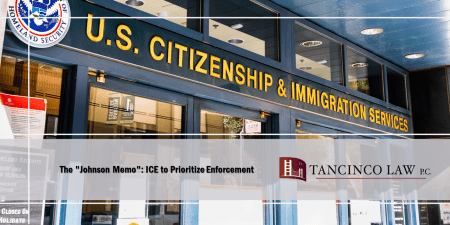The U.S. Immigration and Customs Enforcement (ICE) Acting Director Tae Johnson released its ICE memorandum known as the “Johnson Memo” and laid out three priorities for enforcement:
- national security,
- border security and
- public safety.
The new memo applies to every stage of enforcement, from deciding whether to arrest someone to deciding whether to deport them.
Presumed priorities are defined in the memo under these 3 categories.
For the third presumed priority under public safety, the individual must have been convicted of an aggravated felony or trigger the gang participation prong and must pose a threat to public safety. ICE officers are instructed to consider various factors before deciding to arrest or deport. These factors include: first, the extensiveness, seriousness, and recency of the criminal activity; and second, presence of mitigating factors, including, but not limited to:
- Personal and family circumstances;
- Health and medical factors;
- Ties to the Community;
- Evidence of rehabilitation; and
- Whether the individual has potential immigration relief available.
Prioritizing enforcement is a dramatic departure from the prior administration policy of deporting families who have lived for years in the United States, terrorizing immigrant communities and a reported increase in “collateral” arrests of individuals who were separated from their families.
The Johnson Memo is only an interim memo, and the Department of Homeland Security (DHS) Secretary will publish new rules for ICE officers, likely within 90 days. If you or any family member is at risk of removal or arrest, or has a final order of removal, it will be best to contact our office to determine if you fit the criteria for a presumed priority or not. Since this Memo does not completely take out ICE’s authority to apprehend, detain and remove individuals, one may want to have his or her case analyzed to determine whether it falls outside the presumed priority and if available reliefs are available.


